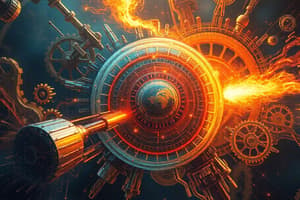Podcast
Questions and Answers
What aspect of motion does mechanics focus on?
What aspect of motion does mechanics focus on?
What type of motion is described by rotational motion in mechanics?
What type of motion is described by rotational motion in mechanics?
When do relativistic motions become relevant according to the text?
When do relativistic motions become relevant according to the text?
How do engineers employ thermodynamics in their work?
How do engineers employ thermodynamics in their work?
Signup and view all the answers
What enables physicists, engineers, and technologists to create solutions to complex challenges according to the text?
What enables physicists, engineers, and technologists to create solutions to complex challenges according to the text?
Signup and view all the answers
What does the Zeroth Law of Thermodynamics state?
What does the Zeroth Law of Thermodynamics state?
Signup and view all the answers
Who is credited with developing the field of mechanics?
Who is credited with developing the field of mechanics?
Signup and view all the answers
Which principle of thermodynamics asserts that energy cannot be created nor destroyed but can change form?
Which principle of thermodynamics asserts that energy cannot be created nor destroyed but can change form?
Signup and view all the answers
What does the Second Law of Thermodynamics state about entropy in a closed system?
What does the Second Law of Thermodynamics state about entropy in a closed system?
Signup and view all the answers
How do engineers impact everyday life using thermodynamic principles?
How do engineers impact everyday life using thermodynamic principles?
Signup and view all the answers
Study Notes
Exploring Thermodynamics and Mechanics in Physics
The interconnected disciplines of thermodynamics and mechanics form the foundation of our understanding of the natural world. Let's examine both subjects individually, highlighting their unique contributions to physics.
Thermodynamics
This branch of physics explores energy conversion, heat transfer, and the relationships among temperature, pressure, and volume. At the core of thermodynamic principles lies the law of conservation of energy, stating that energy cannot be created nor destroyed but can change form. Two prominent theories constitute thermodynamics:
-
Zeroth Law of Thermodynamics: Systems in thermal equilibrium with one another must have the same temperature.
-
First Law of Thermodynamics: Energy is conserved; the increase in internal energy of a system equals the difference between heat supplied and work performed.
Additionally, the Second Law of Thermodynamics states that entropy, the measure of disorder in a closed system, always increases with time unless acted upon by external forces.
These thermodynamic principles influence everyday life by shaping the design of engines, refrigerators, and solar panels. By optimizing energy usage, engineers minimize waste, reduce emissions, and improve efficiencies.
Mechanics
Developed by Sir Isaac Newton, mechanics refers to the scientific discipline studying motion and force. Understanding mechanics equips us with a framework to formulate and test hypotheses regarding objects' motions, collisions, and deformations. Unlike thermodynamics, mechanics focuses exclusively on quantitative aspects of motion.
Mechanics distinguishes between three main types of motion and associated mathematical descriptions:
- Translatory motion describes the displacement of an object in space, governed by linear kinematics and dynamics.
- Rotational motion concerns rotating bodies and is described using angular kinematics and dynamics.
- Relativistic motion becomes relevant when speeds approach light speed, necessitating Einstein's special theory of relativity.
Mechanics provides a firm grasp of the underlying physical principles governing the relative motion of objects, thereby enabling us to develop accurate models to predict and control outcomes, from driving cars to designing robots.
Beyond individual investigation, thermodynamics and mechanics interact synergistically, allowing physicists, engineers, and technologists to create solutions to complex challenges. By employing thermodynamic principles, engineers ensure optimal performance while minimizing resource consumption and environmental impact. Simultaneously, mechanical insights enable robust designs compatible with thermodynamically efficient systems. Such symbiotic development further empowers humankind in exploring technological boundaries and enriching society.
Studying That Suits You
Use AI to generate personalized quizzes and flashcards to suit your learning preferences.
Description
Delve into the foundational concepts of thermodynamics and mechanics in physics, understanding energy conversion, heat transfer, motion, and force. Explore how these interconnected disciplines contribute to our comprehension of the natural world and influence technological advancements.




